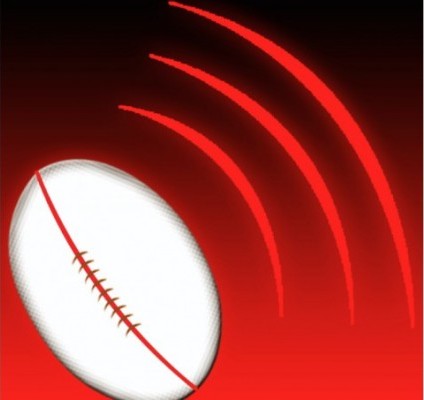2015 7s Player of the Year: Madison Hughes
2015 7s Player of the Year: Madison Hughes
When Mike Friday made Madison Hughes the captain of the USA 7s team last year, there were, naturally, some concerns.
Hughes was young - still in college - was relatively new to the program, and, you figured, still had a lot to learn. Yet he has blossomed.
Hughes is Goff Rugby Report’s 7s Eagle Player of the Year because he is a brilliant combination of things. He can run, he can elude tacklers, he can pass, he can run the offensive and defensive line, and that’s not all. He’s and excellent goalkicker, highlighted by his cool touchline conversion to beat New Zealand in Dubai, and he is also one of the team’s best tacklers. It’s a combination of things that has allowed other players, especially the twin jesters Perry Baker and Carlin Isles, to thrive.
For Hughes, the pressure to perform has sometimes nagged at him - he could be seen smacking himself on the head for making mistakes - but time and Friday’s trust have allowed him to settle down.
“As a young player, I think it's easy to fall into the trap of thinking you've got to force things, instead of letting the game come to you a little,” the Dartmouth grad told Goff Rugby Report. “I probably also struggled a bit with switching back and forth from college rugby to the World Series, where the demands on me, and my role within the team, are quite different. With the attacking threats on our side, I can afford to be patient and see the opportunity instead of trying to create something out of nothing.”
But, part of why the Eagles started to win tournaments, and why he gets our award, is because he learned from that, continued to get better, and learned to be a better leader. Now the player who would get angry with himself has become the one setting an example for his teammates.
“I try to fill the roles that I think the team needs, and with our group, often I try and play the calming influence,” Hughes said. “While we have guys with experience on the Series, no one on our team has consistently been up there competing with the established nations in the final stages of the tournament. So it's been a learning process for all of us, me as much as anyone. I've always prided myself on bouncing back quickly from mistakes, but I think I've learned more recently how one person's attitude can easily spread. If I express my frustration at something, I may be able to quickly recover and move on to the next task, but my outward frustration can affect others for much longer. So controlling my emotions so I don't negatively impact those around me has been something I've looked at.”
As the Eagle team started to play together they made improvements. They won the Bowl in Australia, but then faltered in Dubai. After that, however, the USA made the top eight eight times in nine tournaments, with the other event being a Bowl win. They won London, finished 3rd in Dubai this fall, and also, of course, won the NACRA 7s over Canada to earn qualification to the 2016 Olympics.
“It really has been a crazy year,” said Hughes. We began the 14/15 season very optimistic and excited, but not everything went exactly as planned in the first three tournaments. Our Plate win in Port Elizabeth at the end of 2014 though showed what we could do, but who knew at that point if we would be able to rise higher than that. We kept improving as 2015 went on, but still let ourselves down in certain areas at times preventing us from putting it all together.
“Mike likes to say ‘You've got to get it wrong to get it right’ and that was definitely true for us. We had our setbacks, with the quarterfinal losses to Scotland in Wellington and Samoa in Hong Kong ones that will live long in my memory, but we learned from these, and as time passed there was a definite sense within the squad that we were making genuine positive strides as a group.”
In London, things just came together.
“In London we could feel something special growing as the tournament continued, and the whole team was just clicking,” explained Hughes. “I find it hard to describe, as it's easier to point to the X's and O's of what we did better, but this feeling we had among the group was just on another level and felt so special, as if everyone was reading from the same page. We never hit the same peaks, performance-wise, at NACRA, but clinching that Olympic berth was such a special moment. For so long we'd been looking forward to that one winner-take-all match against Canada, so to finally be able to look past it was amazing.”
Hughes uses the word “we” a lot, and that makes sense. There have been plenty of contributors to the USA’s improvement the Sevens World Series. Maka Unufe is defensively secure and a terrific support runner. Baker and Isles provide long-range scoring ability like no two players can (those two combined for 60 tries sharing time at wing, while the series leader had 47). Zach Test carried this team for years and remains hugely influential - like Hughes he can do a little bit of everything. Andrew Durutalo made big plays all season, as did Danny Barrett, and there’s Folau Niua, who pushed Hughes for Player of the Year.
“I just feel so lucky to have the teammates I do,” said Hughes. “There's no one else I'd want to take the field with, and all of them make my life so much easier, both on and off the field (most of the time!). Working with Mike Friday has been incredible. He's the best 7s coach in the world, bar none. And to have Chris Brown and Phil Greening, who both bring such expert supplemental knowledge, I really don't think we could be better prepared.
“We've grown so much as a group, and we've become much closer. Even as people come and go, this team culture remains. Of course, we still fall out from time to time, but the bonds we form in practice, in the yakayard, and on the pitch have made us so tight that we come back stronger, focused on improving and meeting our goals.”
The bond between the playmakers Hughes and Niua has been an interesting one. Their backgrounds could hardly be more different - Niua is from East Palo Alto and was toughened up in the rough neighborhoods of the Bay Area, and Hughes played for exclusive Wellington College in England, and then Dartmouth (his mother is American, which is why he’s an Eagle). He was a star for the HS All Americans and USA U20s, whole Niua worked his way through clubs in the Bay Area before making a name for himself with SFGG.
It took a while, said Hughes, for the two players to work together at their best. Hughes has some special words for his halfback partner.
“As you spend more time with Folau though, you realize just how much he cares and the extent he's willing to go for the team. He's also grown so much as a leader on this team, and though he doesn't speak that often, everyone listens when he does. Folau is someone who I think is chronically underappreciated. His kickoffs are beginning to get the recognition they deserve, but his ability to put up contestable kickoffs time and time again is a massive difference-maker for us. Around the park, he works as hard as anyone, getting turnovers at crucial moments (such as against NZ in Dubai to give Perry his opportunity), as well as being so strong in the contact point to help us retain possession. And then his ability to see the right option in attack is amazing. Of course, no one reads it right every time, but I'll often watch back the film and just think: ‘How did he see that?’
It’s the sign of a good leader to deflect the credit, and Hughes does that, but it’s also clear that, despite being the shortest player on the team (Carlin Isles has him beat by an inch), he plays big. His ascendance to the captaincy has coincided with the USA 7s team’s best 12 months in its history. He’s a multi-tool player on a team that has many tools to use, and he’s Goff Rugby Report’s 7s Player of the Year.











